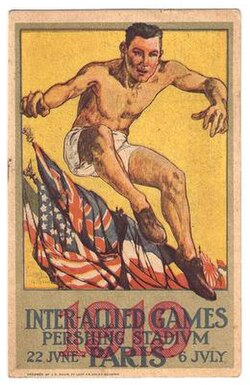This article includes a list of references, related reading, or external links, but its sources remain unclear because it lacks inline citations .(August 2019) |
 The poster for the Inter-Allied Games, depicting an athlete jumping over the flags of the Allied Nations. | |
| Host city | Paris |
|---|---|
| Country | France |
| Opening | 22 June 1919 |
| Closing | 6 July 1919 |


The Inter-Allied Games was a one-off multi-sport event held from 22 June to 6 July 1919 at the newly constructed Pershing Stadium just outside Paris, France following the end of World War I. The host stadium had been built near the Bois de Vincennes by the U.S. Military in cooperation with the YMCA. The event was only open to participation by military personnel who were currently serving or had formerly served in the armed forces during the War. Around 1500 athletes from a total of eighteen nations participated in the proceedings which featured nineteen sports. Following the conclusion of the games, Pershing Stadium was presented as a gift to the people of France from the United States of America. The area, still known as Le Stade Pershing, continues to be used as an open air recreation park to this day.